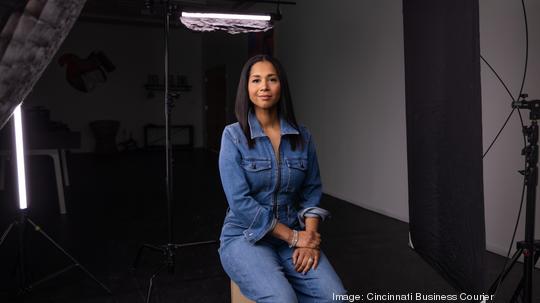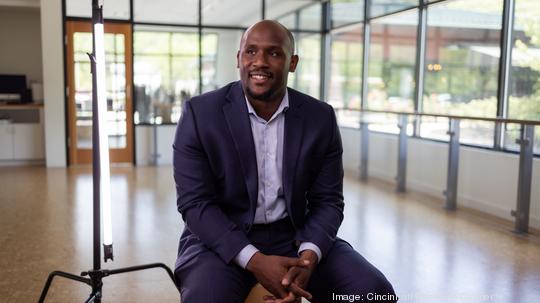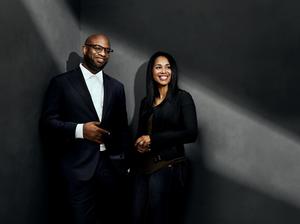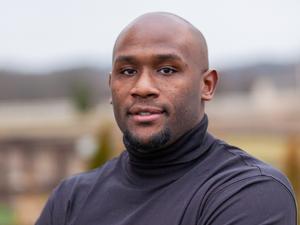The killing of George Floyd in Minneapolis sparked a national conversation about race, challenging business and government leaders to think differently about how they approach equity in their cities.
But for Cincinnati, this wasn’t a new dialogue.
“You name it, and we were already talking about these things,” Candice Matthews Brackeen, general partner of Lightship Capital, said. “While the rest of the country was grappling with these issues, I think we as an ecosystem were already comfortable with having these conversations.”
Matthews Brackeen recalls nearly five years ago when a report revealed that Ohio Third Frontier, whose dollars are meant to be a catalyst for startups throughout the state, wasn’t using its funding equitably. The discovery of that discrepancy led to the formation of the Hillman Accelerator, which Matthews Brackeen also leads. Its goal was straightforward: give minority- and women-led startups the platform and tools to succeed.
Since 2017, the Hillman Accelerator and Lightship Capital’s NewMe Bootcamp have trained 68 companies, with over $100 million raised nationally, officials said. And while the success of Hillman Accelerator and Lightship Capital are indicative of the progress that’s been made locally, there’s still plenty of work to be done.
Since 2015, just 2.4% of venture capital dollars have been raised by Black and Latino founders, according to Crunchbase. And only 5% of technology workers across the nation are African American, according to Cincinnati-based nonprofit Blacks in Technology.
Shwetha Pai, CEO of Cincinnati-based artificial intelligence startup OrgAnalytix, said the effort needed to adequately address equity is so intimidating for some companies that they become paralyzed and the status quo persists.
“This problem exists literally everywhere,” Pai said. “Every place we talk to is worse than the next place or the one prior. You have to focus on the small steps.”
Cincy Inno spoke with four minority entrepreneurs to learn how the events of the past year have affected their efforts and renewed their sense of determination.
Making DEI part of the DNA

OrgAnalytix, a Cincinnati startup that helps companies build teams that are both diverse and inclusive, celebrated its fifth anniversary in January. But it almost went belly up in 2020 due to Covid-19.
Diversity programs, like the ones OrgAnalytix helps build, are often the first to go when corporate budgets tighten. But co-founder and CEO Shwetha Pai never imagined what would happen after the worldwide George Floyd protests, which ushered in a new call to fight racial injustice and make strides toward inclusion.
OrgAnalytix, and others in the space, are now working much more collaboratively to help solve some of the issues at hand.
Pai’s startup, a 2019 UpTech grad, has formed several key partnerships over the past year to further its initiative, including one that’s created a new company, LeanDEI. That firm combines OrgAnalytix’s technology with an empathetic AI chatbot developed by Austin-based Weeve and a corporate coaching team from Houston-based TurnKey Coaching to improve a company’s DEI (diversity, equity and inclusion) strategy.
The program, in short, starts with a network analysis to highlight both key influencers within the organization and those on the periphery. Using the AI chatbot, LeanDEI can engage with the latter group and dynamically identify hurdles and solutions, uplifting and supporting underrepresented individuals within a company. Coaches help implement those ideas.
The partnership is OrgAnalytix’s most significant to date, Pai said, and LeanDEI has a pipeline of around $2 million in sales. Her company plays a much more behind-the-scenes role – it performs a lot of the backend analytics – but Pai said the idea is gaining traction because it’s an out-of-the-box solution.
“When you think about diversity programs, one of the biggest pain points we kept hearing is that it’s overwhelming. That itself can be the reason why people don’t do anything,” Pai said. “This gives you all the steps you need to get off the ground. We’ve gone from (working with) very large financial clients, who are looking for comprehensive DEI programs, to small state or city governments. It runs the gamut.”
That gamut also includes a heavy focus on venture capital firms looking to invest in diversity tools, both for themselves and their portfolio companies. Pai said that’s huge, especially given the industry’s historic disparities. Although stats vary, less than 3% of venture funding money has gone to Black and Latino founders, she said. As an Indian woman, Pai herself has struggled to raise capital.
While the past year has furthered the conversation around DEI, there is still a lingering fear, common in the startup community, that this is only a trend. Or that DEI could become a back-burner issue. Pai said in order to be sustainable, DEI efforts need to be intentional.
Now, more than a year since Floyd’s death, has enough progress been made? For Pai, that answer depends on the day.
“It’s too early to tell, and that in itself is frustrating, because this is an issue that’s existed for a long time. It shouldn’t be too early,” she said. “I have been in the workforce for almost 20 years, and every company (I’ve been a part of) has claimed to be focused on diversity. Yet, the fact that we’re still here is disheartening. That being said, there is a lot of momentum. There is a lot of true focus.” That gives me hope.”
She has liftoff

Don’t tell Candice Matthews Brackeen there are no Black-led unicorns, a prestigious title given to startups valued at more than $1 billion. She’ll point you immediately toward Calendly, a scheduling software startup from Atlanta now valued at $3 billion.
For Matthews Brackeen, this is representative of broader issue: The stories of Black startup founders are not as widely circulated as their white-led counterparts are. Her firm, Lightship Capital, is working to rectify that with strategies she hopes the broader Cincinnati business community will adopt.
“In Cincinnati, it’s about sharing a story of our wins,” she said.
Locally, Lightship Capital has become one of the most notable voices for championing the work of diverse founders. Matthews Brackeen serves as the firm’s general partner alongside her husband, Brian Brackeen.
“If you add together the groups we serve,” Matthews Brackeen said, from Black and Latino founders to members of the LGBT community and those with disabilities, “that’s the majority of people. (It’s greater) than if you just break out the one small subset who are more likely getting the funding — white men.”
Matthews Brackeen’s years of work culminated with the launch of a $50 million, three-year fund last June, which officials say is the largest ever created specifically for minority entrepreneurs. More than half of the funding already is accounted for, and at least three additional investments are on the way.
This March, Lightship Capital, alongside its sister company, Hillman Accelerator, was awarded $5 million from Ohio Third Frontier, the state-backed fund designed to boost startups. The funds will be used to invest in entrepreneurs underserved by traditional venture capital and banking industries.
Ideally, if Matthews Brackeen and her team can continue to develop and support strong entrepreneurs, their work stands to help the region attract even bigger venture capital names, the ones needed to complete big ticket deals. Having access to those deeper pockets is critical to retaining top talent, she said.
“We believe our role is to train the talent we have in the region, attract talent here, and retain them here,” Matthews Brackeen said.
But Lightship Capital’s ambition extends well beyond the Tri-State. This year, they’ll enter Tulsa, Okla., once home to the famous Black Wall Street that was destroyed during riots in 1921. There, Matthews Brackeen’s team will run accelerator planning to help nurture a new generation of Black founders. It’s an extension of the work they’re already doing here, and indicative of Lightship Capital’s potential for exponential growth.
“Here we are today building something on a national scale that can effect real change,” Matthews Brackeen said.
How to turn skepticism into hope

Adam Brown’s 2-year-old Trenton-based startup ClinArk specializes in helping sponsors, contract research organizations and research sites recruit underrepresented patient populations. Most recently, it rolled out a cultural competency training program to help clinical study teams improve their interactions with minority communities.
It’s not an easy lift. In communities of color, there’s a deeply rooted history of mistrust in the health care system. The Covid-19 pandemic has catapulted that issue front and center like never before.
But Brown sees waves of change. He’s watched as more minority-owned businesses have popped up in the region. He sees larger businesses increasingly taking those upstarts under their wing, although more of that effort is needed. In recent weeks, he attended a think tank hosted by the Duke Clinical Research Institute, and the people at the table were from “all walks of life,” he said. In other words, the conversation about diversity and inclusion is no longer happening in a silo.
“That’s crucial,” Brown said. “We have to create a longer table, so we can bring in more people. It’s about improving the way we as human beings interact with each other, and getting people thinking about diversity more frequently is going to be key.”
It’s also about creating opportunities, he said, not just funding various grants and initiatives. When ClinArk hires community engagement specialists, for example, it doesn’t necessarily require a college degree – given that a racial gap exists when it comes to college attainment – but rather the company looks for those eager to make a change and do meaningful work. It’s about inspiring kids to become entrepreneurs, or doctors.
There’s still a lack of diversity particularly at that level in the clinical research space.
“I’m definitely optimistic,” Brown said. “I just want to keep our foot on the pedal. It’s a learning curve. We’re doing something that hasn’t been done before, so we have to be patient with each other. I think if we keep pushing, it will get easier.”
Mortar boosts accessibility for local businesses

When PayPal committed $530 million in 2020 to support Black-owned businesses, Pendleton-based Mortar was the only Ohio organizations tapped for its September round of community grants.
The funds – Mortar received $150,000 from PayPal – contributed to a record-setting fundraising year for the organization, which provides programming and support for minority entrepreneurs. Of the $1.84 million Mortar brought in, a third was related to social justice work or Covid-19 relief.
Mortar’s position as a nonprofit with a very specific mission is an obvious earmark for such initiatives. But hurdles existed, executive director and co-founder Allen Woods said. Pledges were made, but with few, if any, details immediately available.
There exists a lack of accountability overall. Are any local or national organization tracking the end results? Some grant announcements also felt overly trendy. Like it was the “it” thing to do in the moment, he said.
“Time will tell what sticks and who’s really committed to longevity,” Woods said. “A lot of people weren’t aware of all the reasons entrepreneurship isn’t as accessible for people of color and for women. Last year really opened their eyes.”
Woods said Cincinnati has been the perfect environment for the group to grow. Since its 2014 founding, Mortar has expanded to six other cities, and more have come calling. Its team of eight serves over 2,000 entrepreneurs each year. More consistent funding means the organization can do more, and help more people.
Whether the recent push for more diversity, equity and inclusion has a long-term impact, he prefers to take a wait-and-see approach.
“Systematic racism was not created in a year, so it’s going to require a long-term plan and agenda to reverse the effects of that,” Woods said. “The same way corporations create strategic plans five, 10 or 20 years out, they need to build plans for longevity. It can’t be something spontaneous or reactive. It needs to become part of the tapestry.”








